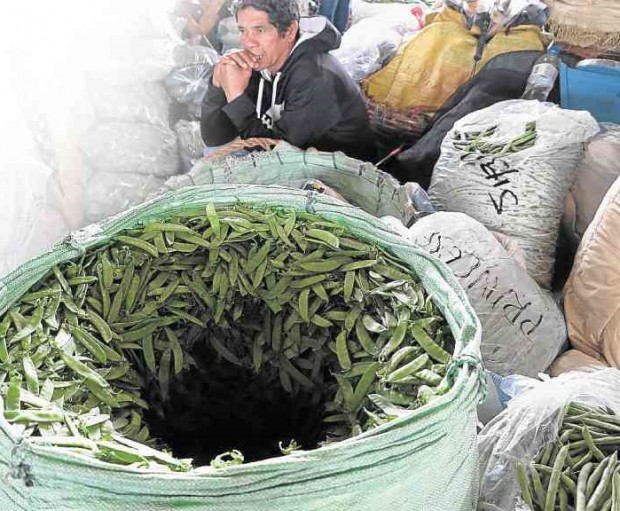
VEGETABLES that Metro Manila consumes come each day from the La Trinidad trading post in Benguet province, where farmers sell carrots, cabbages, cauliflower and broccoli. This week, the municipal government evicted the farmers and traders and gave them a month to relocate to a government trading facility. EV ESPIRITU/INQUIRER NORTHERN LUZON
LA TRINIDAD, Benguet—The mayor of this Benguet capital town has evicted 3,000 farmers, retailers and vegetable truckers from their trading post and ordered them to transact business instead at a government-financed facility.
Mayor Edna Tabanda gave the farmers until March 1 to transfer and trade their produce at the Benguet Agri-Pinoy Trading Center (BAPTC), which was opened last year but has been drawing few takers as most farmers preferred to sell their wares for free at the old trading post near the town hall.
Many farmers have petitioned the local government to remove operational fees which the BAPTC is collecting each time they do business in the
facility.
Benguet farmers supply the daily salad vegetable needs of Metro Manila and outlying provinces. Farmers produce carrots, potatoes, cabbages, cauliflower, broccoli and string beans which are sold to traders and distributors.
As much as 1.3 million tons of vegetables are sold and ferried each day from the old trading post, according to the Benguet Farmers’ Marketing Cooperative.
Since it opened, BAPTC has been trading no more than 40 tons of assorted vegetables.
At least 20 trading posts similar to BAPTC are being developed in the provinces by the Department of Agriculture (DA) to serve as a distribution network for homegrown produce.
But farmers have expressed reservation about selling at the BAPTC due to unfamiliar requirements. For example, BAPTC requires them to undergo accreditation, among other things.
“We will leave if the eviction notice has legal basis,” said Jonathan Tercero, president of the trading post’s “bagsakan” group. He said 300 members of his group have received the eviction notice despite the fact that they have business permits for operating at the old trading post.
According to him, only 35 percent of the members would be qualified to transact at the BAPTC due to a tonnage rule. He said the BAPTC requires each farmer to undertake a minimum transaction of 1,000 kilograms of vegetables each day.
Unlike in the old trading post, retail is not permitted inside the BAPTC premises, he said.
He said farmers and traders may develop their own trading area should they be forced to leave the old trading post. Kimberlie Quitasol, Inquirer Northern Luzon